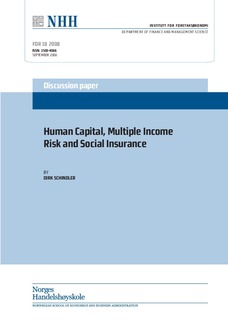| dc.contributor.author | Schindler, Dirk | |
| dc.date.accessioned | 2008-10-21T11:19:30Z | |
| dc.date.available | 2008-10-21T11:19:30Z | |
| dc.date.issued | 2008-09 | |
| dc.identifier.issn | 1500-4066 | |
| dc.identifier.uri | http://hdl.handle.net/11250/164131 | |
| dc.description.abstract | We set up an OLG-model, where households both choose human capital
investment and decide on investing their endogenous savings in a portfolio
of riskless and risky assets, exposing them to (aggregate) wage and capital
risks due to technological shocks. We derive the optimal public policy mix
of taxation and education policy. We show that risks can be efficiently diversified
between private and public consumption. This results hinges on that
the government can apply a wide set of instruments, including differentiated
wage and capital taxation. We also show that for sufficient risk aversion the
(Northern) European way of relying on progressive wage taxation and granting
education subsidies is an optimal response to wage and capital risks. | en |
| dc.language.iso | eng | en |
| dc.publisher | Norwegian School of Economics and Business Administration. Department of Finance and Management Science | en |
| dc.relation.ispartofseries | Discussion paper | en |
| dc.relation.ispartofseries | 2008:18 | en |
| dc.subject | optimal income taxation | en |
| dc.subject | multiple income risks | en |
| dc.subject | human capital investment | en |
| dc.subject | portfolio choice | en |
| dc.title | Human capital, multiple income risk and social insurance | en |
| dc.type | Working paper | en |
| dc.subject.nsi | VDP::Samfunnsvitenskap: 200::Økonomi: 210::Samfunnsøkonomi: 212 | en |
